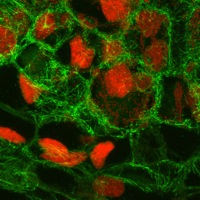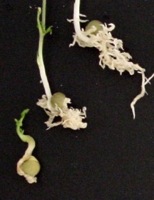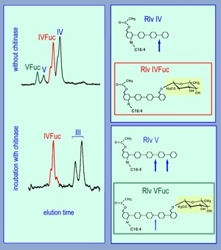Laboratory of molecular and cellular biology
Head of the laboratory — Viktor Evgen’evich TSYGANOV, Candidate of Biological Sciences
 Laboratory of Molecular and Cellular Biology was founded in 2006 as a result of fusion of
two research groups that had been separated from the Laboratory of genetics of plant-microbe
interactions and the Laboratory of rhizospheric biology, with the Electron microscopy Group.
The formation of the laboratory was dictated by the need to increase research level in the
field of cell and molecular biology in ARRIAM.
Laboratory of Molecular and Cellular Biology was founded in 2006 as a result of fusion of
two research groups that had been separated from the Laboratory of genetics of plant-microbe
interactions and the Laboratory of rhizospheric biology, with the Electron microscopy Group.
The formation of the laboratory was dictated by the need to increase research level in the
field of cell and molecular biology in ARRIAM.
Our research studies involve different legume species, including model legumes such
as Lotus japonicus and Medicago truncatula. The special attention is given to
the classical object of plant genetics and the important legume crop in
Europe - Pisum sativum.
Research Projects
The research activity of our laboratory is focused on three major topics:
The study of molecular-genetic and structural mechanisms of cell differentiation
upon symbiotic nodule development.
 The existence of two cell types in nodules – infected and non-infected cells - raises a
question about the mechanisms of cell differentiation during nitrogen-fixing nodule
development. Our research studies involve vast collection of pea symbiotic mutants having
defects at different stages of symbiosis development. The role of different bioactive
substances (such as hydrogen peroxide, nitrogen oxide NO, chromosaponin I and others) in
symbiotic nodule development is under intensive study as well. The great attention is
paid to the study of different cell structure reorganisation (first of all,
cytoskeleton) upon nodule development.
The existence of two cell types in nodules – infected and non-infected cells - raises a
question about the mechanisms of cell differentiation during nitrogen-fixing nodule
development. Our research studies involve vast collection of pea symbiotic mutants having
defects at different stages of symbiosis development. The role of different bioactive
substances (such as hydrogen peroxide, nitrogen oxide NO, chromosaponin I and others) in
symbiotic nodule development is under intensive study as well. The great attention is
paid to the study of different cell structure reorganisation (first of all,
cytoskeleton) upon nodule development.
The study of molecular-genetic and cellular mechanisms of adaptation of legume
plants and their symbiotic systems to stress factors.
 Symbiotic systems formed by legume plants on the one hand are sensitive to different
stress factors and on the other hand they allow plants to increase their adaptive
properties upon unfavorable conditions. Our studies are focused on several model
stress factors: high density soil and cadmium, the role of ‘stress’ hormone ethylene is
under our investigation as well.
Symbiotic systems formed by legume plants on the one hand are sensitive to different
stress factors and on the other hand they allow plants to increase their adaptive
properties upon unfavorable conditions. Our studies are focused on several model
stress factors: high density soil and cadmium, the role of ‘stress’ hormone ethylene is
under our investigation as well.
Our investigation involves appropriate genetic models – pea mutant SGEcrt, exhibiting
increased sensitivity to substrate density (Tsyganov et al., 2000) and pea mutant SGECdt,
demonstrating increased tolerance to toxic cadmium concentration and cadmium
accumulation in biomass (Tsyganov et al., 2007).
The study of signaling events upon legume-Rhizobium symbiosis.
 Research interest of the group focuses on signal exchange between nodule bacteria and
legume plants. To study mechanisms of Nod-factor reception we are developing approaches
for heterologous expression of receptor proteins in microorganisms, as well as
expression in homologous system - in plants (transgenic technologies) and subsequent
analysis of ligand-binding affinity of the receptors. The ligand-binding assay of
receptor proteins will allow us to determine their specificity and affinity to
Nod-factors. Another topic of the group research is the investigation of major
transcription regulators of Nod-factor-depending signaling and cytokinine-dependent
signaling pathway, studying their expression dynamics and localization upon nodule
development.
Research interest of the group focuses on signal exchange between nodule bacteria and
legume plants. To study mechanisms of Nod-factor reception we are developing approaches
for heterologous expression of receptor proteins in microorganisms, as well as
expression in homologous system - in plants (transgenic technologies) and subsequent
analysis of ligand-binding affinity of the receptors. The ligand-binding assay of
receptor proteins will allow us to determine their specificity and affinity to
Nod-factors. Another topic of the group research is the investigation of major
transcription regulators of Nod-factor-depending signaling and cytokinine-dependent
signaling pathway, studying their expression dynamics and localization upon nodule
development.
© 2004-2009 All-Russia Research Institute for Agricultural Microbiology
With any questions feel free to contact the webmaster - webmaster@arriam.spb.ru.
|


















 Laboratory of Molecular and Cellular Biology was founded in 2006 as a result of fusion of
two research groups that had been separated from the Laboratory of genetics of plant-microbe
interactions and the Laboratory of rhizospheric biology, with the Electron microscopy Group.
The formation of the laboratory was dictated by the need to increase research level in the
field of cell and molecular biology in ARRIAM.
Laboratory of Molecular and Cellular Biology was founded in 2006 as a result of fusion of
two research groups that had been separated from the Laboratory of genetics of plant-microbe
interactions and the Laboratory of rhizospheric biology, with the Electron microscopy Group.
The formation of the laboratory was dictated by the need to increase research level in the
field of cell and molecular biology in ARRIAM. The existence of two cell types in nodules – infected and non-infected cells - raises a
question about the mechanisms of cell differentiation during nitrogen-fixing nodule
development. Our research studies involve vast collection of pea symbiotic mutants having
defects at different stages of symbiosis development. The role of different bioactive
substances (such as hydrogen peroxide, nitrogen oxide NO, chromosaponin I and others) in
symbiotic nodule development is under intensive study as well. The great attention is
paid to the study of different cell structure reorganisation (first of all,
cytoskeleton) upon nodule development.
The existence of two cell types in nodules – infected and non-infected cells - raises a
question about the mechanisms of cell differentiation during nitrogen-fixing nodule
development. Our research studies involve vast collection of pea symbiotic mutants having
defects at different stages of symbiosis development. The role of different bioactive
substances (such as hydrogen peroxide, nitrogen oxide NO, chromosaponin I and others) in
symbiotic nodule development is under intensive study as well. The great attention is
paid to the study of different cell structure reorganisation (first of all,
cytoskeleton) upon nodule development.
 Symbiotic systems formed by legume plants on the one hand are sensitive to different
stress factors and on the other hand they allow plants to increase their adaptive
properties upon unfavorable conditions. Our studies are focused on several model
stress factors: high density soil and cadmium, the role of ‘stress’ hormone ethylene is
under our investigation as well.
Symbiotic systems formed by legume plants on the one hand are sensitive to different
stress factors and on the other hand they allow plants to increase their adaptive
properties upon unfavorable conditions. Our studies are focused on several model
stress factors: high density soil and cadmium, the role of ‘stress’ hormone ethylene is
under our investigation as well. Research interest of the group focuses on signal exchange between nodule bacteria and
legume plants. To study mechanisms of Nod-factor reception we are developing approaches
for heterologous expression of receptor proteins in microorganisms, as well as
expression in homologous system - in plants (transgenic technologies) and subsequent
analysis of ligand-binding affinity of the receptors. The ligand-binding assay of
receptor proteins will allow us to determine their specificity and affinity to
Nod-factors. Another topic of the group research is the investigation of major
transcription regulators of Nod-factor-depending signaling and cytokinine-dependent
signaling pathway, studying their expression dynamics and localization upon nodule
development.
Research interest of the group focuses on signal exchange between nodule bacteria and
legume plants. To study mechanisms of Nod-factor reception we are developing approaches
for heterologous expression of receptor proteins in microorganisms, as well as
expression in homologous system - in plants (transgenic technologies) and subsequent
analysis of ligand-binding affinity of the receptors. The ligand-binding assay of
receptor proteins will allow us to determine their specificity and affinity to
Nod-factors. Another topic of the group research is the investigation of major
transcription regulators of Nod-factor-depending signaling and cytokinine-dependent
signaling pathway, studying their expression dynamics and localization upon nodule
development.